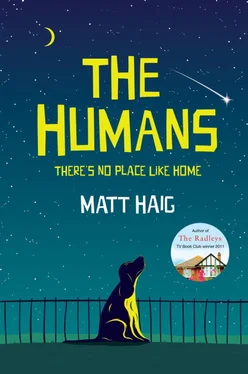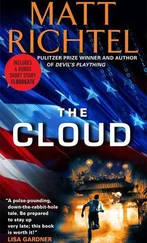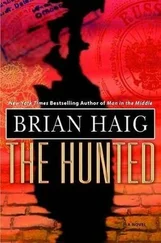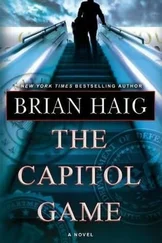‘Should I follow him?’
‘No,’ Isobel said. ‘Give him time.’
I nodded.
I trusted her.
Time was her subject, after all.
An hour later I was in Andrew’s office. It was the first time I had been there since I had deleted the email to Daniel Russell. This time, I wasn’t in a rush and could absorb a few more details. As he was a professor, there were books lining every wall, designed so that from whichever angle you looked at him you would see a book.
I looked at some of the titles. Very primitive-looking in the main. A History of Binary and Other Non-decimal Numeration. Hyperbolic Geometry. The Book of Hexagonal Tessellation. Logarithmic Spirals and the Golden Mean .
There was a book written by Andrew himself. One I hadn’t noticed the last time I had been here. It was a thin book called The Zeta Function . It had the words ‘Uncorrected Proof Copy’ on the cover. I made sure the door was locked and then sat down in his chair and read every word.
And what a depressing read it was, I have to say. It was about the Riemann hypothesis, and what seemed like his futile quest to prove it and explain why the spaces between prime numbers increased the way they did. The tragedy was in realising how desperately he had wanted to solve it – and, of course, after he’d written the book he had solved it, though the benefits he’d imagined would never happen, because I had destroyed the proof. And I began to think of how fundamentally our equivalent mathematical breakthrough – the one which we came to know as the Second Basic Theory of Prime Numbers – had on us. How it enabled us to do all that we can do. Travel the universe. Inhabit other worlds, transform into other bodies. Live as long as we want to live. Search each other’s minds, each other’s dreams. All that.
The Zeta Function did, however, list all the things humans had achieved. The main steps on the road. The developments that had advanced them towards civilisation. Fire, that was a biggie. The plough. The printing press. The steam engine. The microchip. The discovery of DNA. And humans would be the first to congratulate themselves on all this. But the trouble was, for them, they had never made the leap most other intelligent life forms in the universe had made.
Oh, they had built rockets and probes and satellites. A few of them even worked . Yet, really, their mathematics had thus far let them down. They had yet to do the big stuff. The synchronisation of brains. The creation of free-thinking computers. Automation technology. Inter-galactic travel. And as I read, I realised I was stopping all these opportunities. I had killed their future.
The phone rang. It was Isobel.
‘Andrew, what are you doing? Your lecture started ten minutes ago.’
She was cross, but in a concerned way. It still felt strange, and new, having someone be worried about me. I didn’t fully understand this concern, or what she gained by having it, but I must confess I quite liked being the subject of it. ‘Oh yes. Thank you for reminding me. I will go. Bye, erm, darling.’
Be careful. We are listening.
The problem with equations
I walked into the lecture hall. It was a large room made predominantly of dead trees.
There were a lot of people staring at me. These were students. Some had pens and paper. Others had computers. All were waiting for knowledge. I scanned the room. There were 102 of them, in total. Always an unsettling number, stuck as it is between two primes. I tried to work out the students’ knowledge level. You see, I didn’t want to overshoot. I looked behind me. There was a whiteboard where words and equations were meant to be written but there was nothing on it.
I hesitated. And during that hesitation someone sensed my weakness. Someone on the back row. A male of about twenty, with bushy blond hair and a T-shirt which said ‘What part of N = R x f sx f px n ex f lx f ix f cx L don’t you understand?’
He giggled at the wit he was about to display and shouted out, ‘You look a bit overdressed today, Professor!’ He giggled some more, and it was contagious; the howling laughter spreading like fire across the whole hall. Within moments, everyone in the hall was laughing. Well, everyone except one person, a female.
The non-laughing female was looking at me intently. She had red curly hair, full lips and wide eyes. She had a startling frankness about her appearance. An openness that reminded me of a death flower. She was wearing a cardigan and coiling strands of her hair around her finger.
‘Calm down,’ I said, to the rest of them. ‘That is very funny. I get it. I am wearing clothes and you are referring to an occasion in which I was not wearing clothes. Very funny. You think it is a joke, like when Georg Cantor said the scientist Francis Bacon wrote the plays of William Shakespeare, or when John Nash started seeing men in hats who weren’t really there. That was funny. The human mind is a limited, but high plateau. Spend your life at its outer limits and, oops, you might fall off. That is funny. Yes. But don’t worry, you won’t fall off. Young man, you are right there in the middle of your plateau. Though I appreciate your concern, I have to say I am feeling much better now. I am wearing underpants and socks and trousers and even a shirt.’
People were laughing again, but this time the laughter felt warmer. And it did something to me, inside, this warmth. So then I started laughing, too. Not at what I had just said, because I didn’t see how that was funny. No. I was laughing at myself. The impossible fact that I was there, on that most absurd planet and yet actually liking being there. And I felt an urge to tell someone how good it felt, in human form, to laugh. The release of it. And I wanted to tell someone about it and I realised that I didn’t want to tell the hosts. I wanted to tell Isobel.
Anyway, I did the lecture. Apparently I had been meant to be talking about something called ‘post-Euclidean geometry’. But I didn’t want to talk about that, so I talked about the boy’s T-shirt.
The formula written on it was something called Drake’s equation. It was an equation devised to calculate the likelihood of advanced civilisations in Earth’s galaxy, or what the humans called the Milky Way galaxy. (That is how humans came to terms with the vast expanse of space. By saying it looks like a splatter of spilt milk. Something dropped out of the fridge that could be wiped away in a second.)
So, the equation:
N = R x f px n ex f lx f ix f cx L
N was the number of advanced civilisations in the galaxy with whom communication might be possible. R was the average annual rate at which stars were formed. The f pwas the fraction of those stars with planets. The n ewas the average number of those planets that have the right eco-systems for life. The f 1was the fraction of those planets where life would actually develop. The f iwas the fraction of the above planets that could develop intelligence. The f cwas the fraction of those where a communicative technologically advanced civilisation could develop. And L was the lifetime of the communicative phase.
Various astrophysicists had looked at all the data and decided that there must, in fact, be millions of planets in the galaxy containing life, and even more in the universe at large. And some of these were bound to have advanced life with very good technology. This of course was true. But the humans didn’t just stop there. They came up with a paradox. They said, ‘Hold on, this can’t be right. If there are this many extraterrestrial civilisations with the ability to contact us then we would know about it because they would have contacted us .’
‘Well, that’s true, isn’t it?’ said the male whose T-shirt started this detour.
Читать дальше












